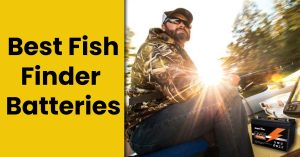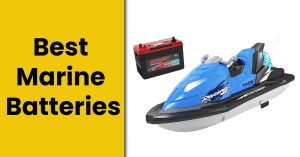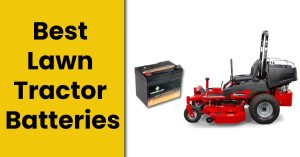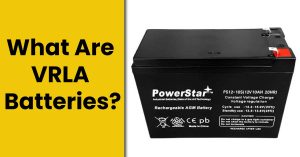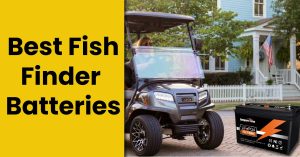Top 10 Best RV Batteries Of 2025: Efficient & Durable
The best RV battery is one that is affordable, reliable, durable, powerful, vibration-resistant, and lightweight.
A reliable source of power for RVs or campers is a must to avoid powerlessness in the wilderness; nobody likes to be stranded in nowhere.
That is why we have only chosen maintenance-free batteries that don’t need any special care for long trips in RVs.
How Do We Choose Batteries For RV?
There are a ton of options available in the market. To decide the absolute best battery, we have shortlisted only 10 batteries of different types that we know are super reliable, durable, affordable, and most importantly, powerful.
We have interviewed over 24 fellow RV geeks, tested over 30 batteries of different types, and gathered data on the internet for over 40 batteries. Finally, we short-listed the 10 best RV batteries for average users.
What Is the Best RV Battery?
Let’s start with lithium batteries, which have the most advantages out there. These are ideal for RV users who are looking for some sort of inverter and solar setup. Lithium batteries are:
Other battery types aren’t going to match with lithium battery types, but the upfront cost is a bit high for these types. Another drawback is that you can’t charge it when it is freezing cold, but it can be worked around using heating pads and a BMS (battery management system).
Battle Born is the leading lithium battery for RVs, according to me. It is super-efficient, with a little bit of a high upfront cost.
Next up are AGM batteries, which are sealed batteries with no maintenance required. If I list the things that kill lead-acid batteries, they are:
- Overcharging and discharging it too deeply.
- Leaving it depleted for an extended period
- Excessive heat.
If I have to pick a maintenance-free battery that includes AGM or Gel is gonna be an INTERSTATE battery that is high-end in this category.
1. Universal Power Group 12V 100Ah Deep Cycle Battery
FEATURES & SPECS
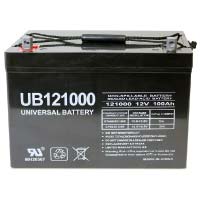
Speaking of the best Rv battery, Universal Power Group 12V is ideal for RV but I have tested it out on my solar kit using four of these deep-cycle batteries.
I pushed them up to 1500 watts for 30 minutes without any significant voltage drop. After 30 minutes, the unloaded voltage returned to 12.8V which is excellent.
Universal Power Group 12V may be large and heavy but their performance is good for an AGM battery.
You can mount them anywhere but Universal 12V batteries are heavy, so make sure to mount them someplace safe where their weight is not a problem.
Valve-regulated AGM technology makes it leak-proof with little to no maintenance. The value for money is also good because of the high energy density.
I own a Forest River FR3 and the amount of power from Universal Group 12V is always consistent with my RV without any fluctuations.
Though some people have complained about the short lifespan of this battery but, mine is working fine for the last 9 months.
Maybe those guys are doing something wrong like not charging it on time, or letting it sit for months before using it.
Overall, Universal Power Group 12V is a decent AGM battery for RVs with consistent power. This might be the best RV deep-cycle battery.
We also have reviewed the top rated Portable RV Generator
2. Optima OPT8016-103 Deep Cycle RV Battery
FEATURES & SPECS
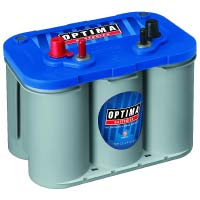
Optima OPT8016-103 utilizes spiral cell technology which has almost three times the life expectancy, and the strongest starting power compared to any lead-acid battery.
The unique spiral cell technology is a robust power source that ensures safety for campers or RV users. It won’t just go down like other cheap batteries.
Optima OPT8016-103 is a dual-purpose battery that is used for both starting and cycling for RV and boat people which require strong cranking and starting even when they are in tough conditions.
It has 750 cold-cranking amps `which is excellent for such weather conditions.
Optima OPT8016-103 RV battery is specially engineered for recreational vehicles with high reserve capacity providing longer shelf-life. It is super reliable.
Optima has its charges rated for Optima, but you don’t have to use them only. Many other charges will work just fine like Pro-Logic smart charger.
Suppose I am down 10 volts and I have discharged this battery, then will start charging 10 amps or 20 amps for a small amount of time just to recover the battery and then drop down back to 2 amps.
NOTE: For a cold climate, never charge your frozen battery.
Difference between BlueTop, YellowTop, and RedTop Optima Batteries
- BlueTop
It has a traditional auto-post terminal on the top with a 5/16 stainless steel stud terminal to capture the ring-style boat terminals.
It has the ability for cycling and starting with 750 cold-cranking amps, and 870 marine cranking amps at 32 degrees Fahrenheit. The deep cycle ability is about 54 – 55 amp-hours.
- Yellow top
The yellow-top Optima battery is the same except for the terminals. The part is 3478. 78 part is the side post that can be connected to a GM vehicle.
Specs are the same as the blue top but it doesn’t have marine-style studs. Between the red and yellow, yellowTop is the best for automotive applications.
- RedTop
It is for the starting application only. It is not be used for sound systems, movies players, or light bars. It’s a quality off-road battery.
RedTop is also AGM which means it is vibration resistant like its brothers. It has 1000 cranking amps, 800 cold-cranking amps, and a reserve capacity of 100. It also has 3478 dual terminals. I am pretty sure it is the best deep cycle battery.
3. Chins 12V 100AH Lifepo4 Deep Cycle Battery
FEATURES & SPECS
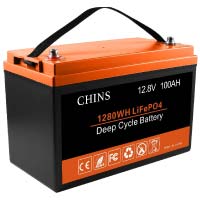
Speaking of the best RV battery, Chins 12v 100ah lifepo4 deep cycle rv battery on Amazon is extremely cheap which I don’t understand. The reviews are also positive and it is UL testing certified which is crazy. I tested it to clear my doubts.
I already used a smaller Chins battery and its built quality was fantastic but the absence of low temp: charging protection was a party pooper for me.
I am gonna do a capacity test and check for the low temp: charging protection sensor.
I charged it first to about 99% at 99amps. I am using a CBA4 and amplifying system for the test.
So after just over 5 hours, I was getting 1300 watts which is superb, low voltage disconnect was about 9.6, so finally I got 104Ah and 1316Wh. I am quite impressed.
Most of the cheap batteries at this price point failed the capacity test but Chins 12v 100ah lifepo4 passed it with flying colors.
BMS placement and cell configuration are pretty solid, the built quality and wiring placement is also well managed, but there wasn’t any low temp: charging protection as expected.
For solar, overheating a lithium iron phosphate battery is not a problem so why not include a low temp charging protection instead of a high temp charging protection.
Ampere time and Chins 12v 100ah lifepo4 batteries are almost identical. Both high temp charging protection but not low temp, the cell configuration, built quality, and even the bar code are the same. Maybe both batteries are built by the same company.
Chins 12v 100ah lifepo4 is a highly efficient and lightweight battery. Despite not having that low temp: charging protection sensor, I like the built quality and overall current draw. Anyone can install their low temp: protection that is not a problem.
The self-discharge rate is excellent, the price point is low, and it is an ideal camper battery.
Checkout our guide about best golf car batteries
4. Redodo 12V 100Ah LifePO4 RV Battery
FEATURES & SPECS
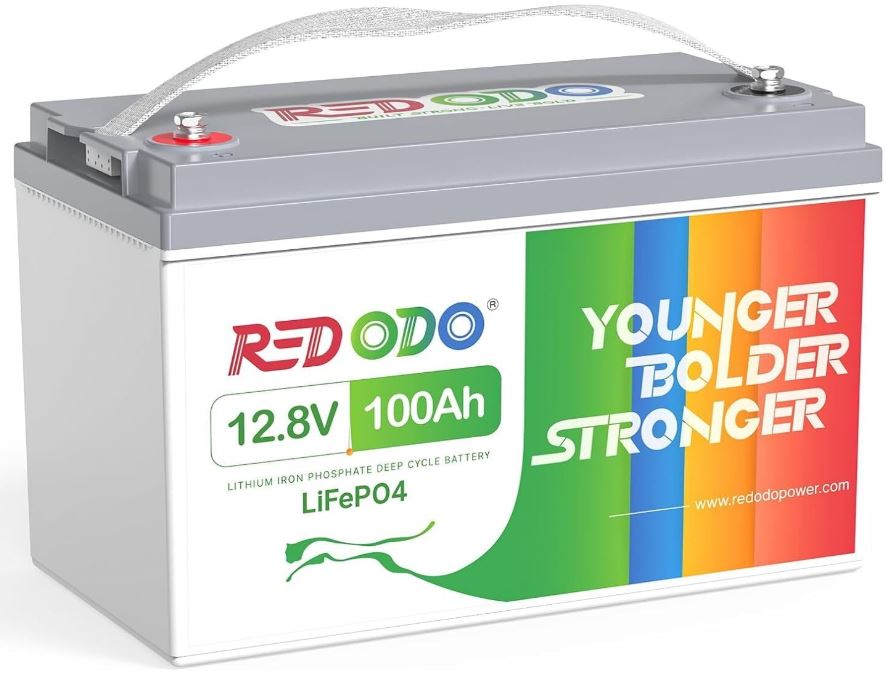
Redodo 12V battery is a good, reliable, and budget option for RV users. It can be recycled up to 4000 – 800 times with a 1 year service time.
Redodo 12V battery is using prismatic lithium cells technology which is known for high energy density, low self-discharge, lightweight, and quality performance.
I also own a Roadtrek RV and I am using the current Redodo battery which is great in terms of performance and weight.
I was having such a hard time getting in and out of the old battery, it took all my strength. Such is not the case with these current LifePO4 Redodo.
If these batteries had low temp cut-off built-in, it would have been the best lifePO4 battery on Amazon period.
I also tested this battery to power an inverter that runs a refrigerator suggested by some of the users online, and surprisingly, it did run the fridge for an entire day. I wasn’t expecting that much of a powerful performance.
I ran some tests of Zooms 12V lifePO4 battery
Firstly, I checked if it can be charged with 100amps as advertised, after 10 minutes I increased the current to 120amps then 138 amps. It was only for testing purposes you don’t want to do that with your lithium iron phosphate batteries.
So after the charging, I tested it for high voltage disconnect to get that final bit of absorption and the current was dropping which was so cool to see that.
I started that test at CBA4 as well, it was 0.2c so I left it for about five hours.
104.21 amp-hours was the incredible result. Redodo 12V passed all the tests with flying colors that is why I highly recommend it for RVs. It may not be the best RV battery, but it is certainly up there.
I was having some doubts about being the same as the CHINS battery because of the test results and capacity I opened it up and it looked the same as CHINS battery.
I think I would like to mention is Redodo 12V battery doesn’t have low temperature charging protection.
Overall, Redodo lifePO4 battery is superb in terms of performance, it is lightweight, reading after fully charged is about 13.4 volts, and it is highly dependable in harsh conditions.
Checkout our guide about best marine batteries
5. ECO-WORTHY 12V 20Ah LiFePO4 RV Battery
FEATURES & SPECS
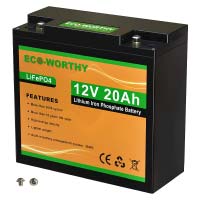
Firstly, ECO-WORTHY 12V is super lightweight and compact. It is solidly built with high energy density, and its performance is also good considering the low price point.
Lithium Iron phosphate is an extremely safe battery with a nominal voltage of 3.2 volts per cell which is pretty much similar to the voltage capacity of a lead-acid battery.
Lithium iron phosphate batteries can go at 80% depth of discharge rate, it doesn’t explode or catch fire that is why I said ECO-WORTHY 12V batteries are super safe. Probably the best RV battery in terms of safety.
Comparing ECO-WORTHY 12V with any lead-acid battery, it is much cheaper and will last much longer that is for sure.
I wired two of these batteries in parallel for my camper, I have the capacity for up to 4 batteries but right now I am using ECO-WORTHY 12V 2 batteries of 20Ah each because mostly I have some 12v interior lights in the camper.
I have a capacity meter set on my case which is plugged in with a shunt that has been wired in line with my power converter.
I have wired the batteries with my solar panels which will eventually charge it.
After turning on some light I was getting a current draw of 600 milliamps on the capacity indicator.
After charging and running the batteries for an entire day, the performance I got was solid, and the energy density was high.
So overall ECO-WORTHY 12V batteries are solidly built, lightweight, the performance is really good considering the size and portability, and these batteries are well within budget. These qualities are expected in the best RV batteries. I would recommend it for campers for sure.
I was skeptical at first after reading online reviews. People were saying ECO-WORTHY 12V was not up to the mark as advertised, but I didn’t notice such a thing. It was the same thing as advertised in terms of capacity and performance.
6. Interstate Batteries 12V 110Ah Deep Cycle Battery
FEATURES & SPECS
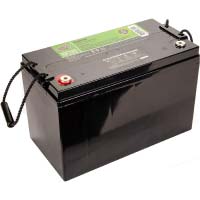
Interstate deep cycle battery is designed to provide constant current over a decent period and it can also withstand deep charges.
I measured the voltage out of the box without charging and it measured up to 12.74 volts which is decent.
Interstate is claiming it won’t spill overpressure due to that valve-regulated technology, I am not going to test it because I am not 100% sure.
I must say that the built quality of this battery is pretty decent. I am not seeing any loose ends. That is why I recommend Interstate batteries for RV and heavy-duty applications. Well, the best RV battery in terms of the built quality award goes to interstate deep cycle battery.
So in a tiny package, we are getting a huge number of cycles which is the reason to be skeptical, but I have tested a couple of these batteries to power my sump pump in Northern Illinois where my grandparents live.
These batteries hold their charge pretty well. It also holds the charge pretty well to run the trolling motor.
While the smaller batteries provide about 35Ah which is not enough for RV applications on a large scale, that is why I recommend a 110Ah Interstate if you don’t want to purchase a couple of smaller batteries. 110Ah Interstate also holds the charge pretty well.
So the smaller 35Ah is useful for a lot of applications where vibration is involved like electric scooters, wheelchairs, elevators, but I would prefer the 100Ah version RVs.
7. Weize 12V 100AH Pure Gel Deep Cycle Rechargeable Battery
FEATURES & SPECS
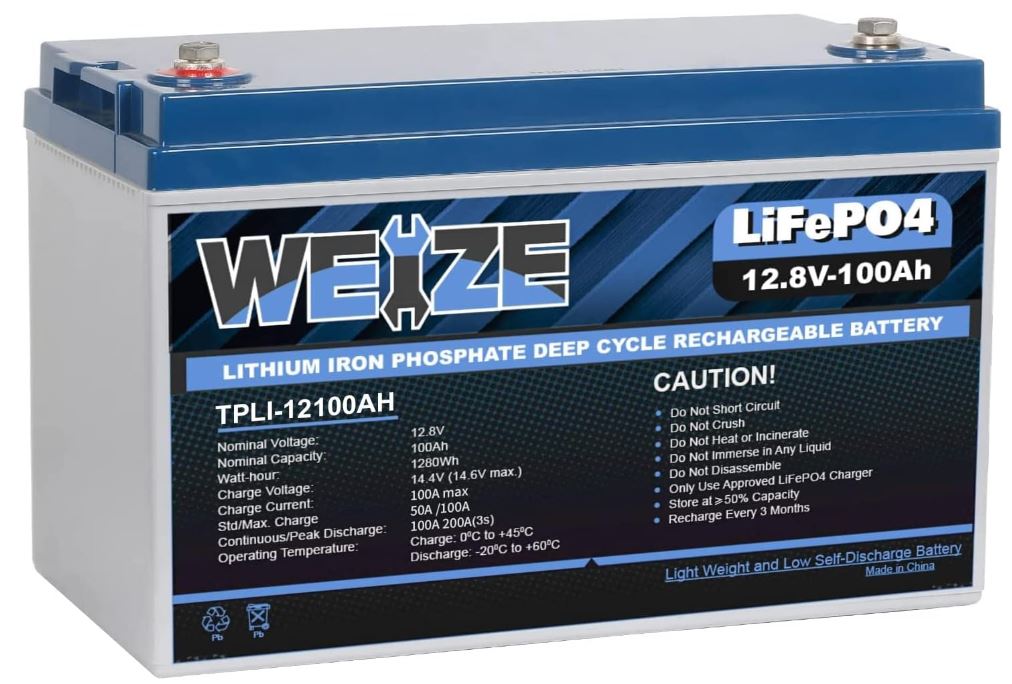
So my first impression of Weize 12V was that it has the same battery case as a Zooms battery, and chin’s battery without low tip charging protection which is scary.
So, I did a capacity test and it had 1 amp-hour less. It pulled 103 amp hours with this battery compared to 104 amp hours of other cheap batteries of similar packing.
To test it, I dismantled Weize 12V apart and it looked apart from with 5 main negative conductors. I am pretty sure it is not another repacked Chin’s battery.
According to the ad, Weize 12V has a BMS for high and low-temperature protection which I have tested and I was shocked that the temperature sensor worked when I dipped it in the ice-cold water.
I can’t believe it has a temperature sensor. Weize 12V might be the best cheap 12V battery that I have tested.
This 100Ah capacity is decent enough to run most of the appliances on your RV if you don’t overcharge it.
I have also tested Weize 12V with 400-watt solar panels and 1000 watt inverter, the battery seems to work fine. It is a lifepo4 so you would expect a longer lifespan. A good battery for RV overall.
8. Ampere Time 12V 100Ah Lithium LifePo4 Battery
FEATURES & SPECS
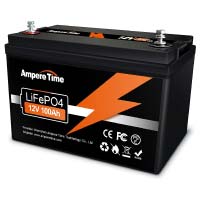
Ampere Time 12V is a premium LifePo4 RV battery in the industry. They also come in 200Ah and 300Ah with the main difference in capacity and the amount of energy they store. Some people rank ampere time as the best RV battery in some conditions.
When I first bought it, I read some reviews online stating that the low-temperature charging protection doesn’t work, so before using Ampere Time 12V I did a capacity test and full load discharge test, and it worked perfectly.
I completely dismantled the battery after using it to check its built quality, and Ampere Time 12V is surprisingly strong. The terminals are solid with lock washers, and they are using high-quality 10 copper 8 gauge wire which is awesome for a 100Ah battery.
So I tested the low temperature charging protection by dipping the temperature sensor in the cold water, and the results were sad. It doesn’t work for low-temperature protection. It does protect from the high temperature though.
This battery is fantastic, and I would recommend it you are sure your battery won’t be exposed to cold temperatures.
I also have a 200Ah Ampere Time 12V battery. I tested it in my RV after turning everything on including the light to check the max: draw. I didn’t go to true zero, I was happy to come close to 90% of the capacity to check the performance.
I was able to get 8 hours and 20 minutes out of this battery at 908 watts peak draw. I pulled from the inverter about 2.22kw. We also know that most inverters are close to 85 to 90% efficient.
I stopped at 10.7 under load which was about another 400 watts roughly because 0% is about 9.5 volts according to the per ampere times documentation. I could have easily taken another 3 – 5 amp hours out of it if I were to drop the load to 40 to 50 watts.
I tested my 200Ah Ampere Time battery and I got about 45Ah off of my charge controller on a rainy day. Then, it was just below 150Ah off of my Victron charger so I got an almost complete draw of 190+Ah while it was still absorption charge when I ended this test.
So overall, I am super impressed by this battery. It is not heavy at all, the built quality is really good, and it is super reliable. For the price point, it is a superb battery for RVs and Campers.
9. Battle Born LiFePO4 Deep Cycle Battery
FEATURES & SPECS
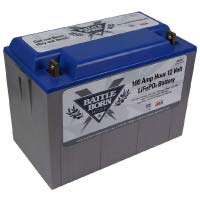
Battle Born is one of the most durable, compact, lightweight, powerful, and reliable RV batteries available in the market.
This battery has four parallel packs holding 30 cells in each totaling 120 cells. The nominal voltage of each cell is about 3.2 volts and 3.4Ah. We get 10.88Wh for each battery cell which is crazy. It is rated at 1280Wh in the advertisement, but in reality, it has 1305Wh capacity.
Battle Born LiFePO4 Deep Cycle Battery uses cylindrical lithium-ion series. It is good in case one cell fails the others will operate but you will get a reduced capacity.
With these batteries, you don’t need to worry about the hydrogen gases development indoors. It enables users to mount it inside cabins or in crawl spaces.
The temperature sensor is directly connected to the cell which is also good.
Battle Born LiFePO4’s power capacity is really good for RV or long-haul vehicle users. People normally purchase 3 or 4 batteries in tandem.
I have also tested 4 Battle Born batteries with 2000 watts of solar and a 23 volt, 3000-watt inverter with an 80amp outback charge controller. I run 400 to 700 watts all night with no problem at all. Batteries charge fasten even on cloudy days.
After 6 months, my views haven’t changed. The batteries are solidly built, powerful, and reliable.
If we compare Battle Born LiFePO4 with the best AGM batteries, AGM batteries are affected by the temperature and have a low upfront cost. Battle born is right up there with the best RV battery list.
The only complaint I have is Battle Born LiFePO4’s price point. They sure provide value for the money but I believe it is a few hundred bucks expensive.
Overall, they can provide 3000 – 5000 cycles by retaining more than 75% of their original powering capacity, they are well made, performance is elite, they provide more Watthours, and these batteries have a quality BMS (battery management system).
10. ExpertPower 12V 100Ah lithium LifePo4
FEATURES & SPECS
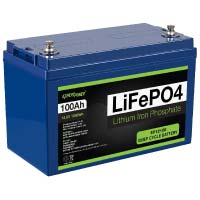
A friend of mine recommended ExpertPower 12V 100Ah because it is safety UL certified under 800 bucks which is a pretty huge deal. I bought it immediately on Amazon.
It has a built-in BMS and low charging temperature protection which the Ruxu battery under a similar price tag doesn’t have.
It is mentioned on the battery that ExpertPower 12V 100Ah only discharges 70amps and charges 50 amps continuously.
If you are trying to connect it to a large inverter, you must find max continuous discharge rate and figure out what your inverter needs. You would need to put multiple batteries in parallel.
First I charges it and did a capacity test to see what it is all about. Almost 30amps was going to the battery through my charges which is good.
Max: load I pulled 9 minutes and 5Ah so it passed the test.
I ran it until it died. So the final test results were 110Ah and 1410Wh which is about 10 to 11% more than they advertised. Now I am impressed with ExpertPower 12V 100Ah.
So I froze this battery by putting it into the refrigerator but the battery was still charging, it shouldn’t charge. It doesn’t have a low temp: charging protection guys. What a bummer.
Beneath the BMS, the cell setup and connections were well made. This is a solidly built battery. This might be the best cheap RV battery that I have tested. It doesn’t have low temp: protection but a Victron solar charge controller would do the job.
I am not going to sugarcoat anything, ExpertPower 12V 100Ah is a superb battery in terms of performance, weight, and life, but not having a low temp: charging protection is no good. Overall, I would recommend this battery.
How To Choose An RV Battery – Buying Guide
After spending hours into research, testing, experimenting, and data gathering, we have not only compiled a list of the top 10 best RV batteries but a convincing buying too which will help you to look at the several factors which an RV battery depends upon.
Type of RV Batteries:
Flooded batteries: These are the most common wet cell battery types. They are affordable, durable, and easy to access. The only drawback is they require regular maintenance. Their lifespan is shorter and their suck at vibration resistance.
AGM: These batteries are sealed lead-acid types. AGM batteries are literally maintenance-free and super reliable for RV users. I would 100% recommend these batteries if you want to live off-grid. AGM is fin but the only drawback of lead-acid batteries is that they don’t work well in cold climates.
Lithium Batteries: These are ideal for RV users. Lithium batteries are long-lasting, durable, highly reliable, powerful, vibration-resistant, and independent of climate. You can get them to charge and work in freezing temps as well.
Our list of the top 10 best RV batteries will help you make a purchasing decision if you are confused.
Weather And Cold Conditions:
Some batteries are specially designed to withstand harsh cold conditions like Optima RedTop AGM deep cycle battery that has 800 cold-cranking amps.
I would recommend Gel batteries for cold conditions because those are less likely to freeze in colder climates.
Lead Acid batteries are not that great in colder climates. Their capacity and efficiency will significantly reduce unless you use battery compartments with heating pads.
Lithium batteries work like a champ in cold weather like Chins 12v 100ah or Zoom batteries. They would need to heat before using charging though.
Always keep BMS (battery management system) in mind. It will protect the battery from high temp: and low: temp charging. BMS is a lifesaver in cold conditions. Most batteries have built-in BMS but make sure to double-check.
Cost:
If cost is not an issue for you, then go for either AGM, GEL, or Lithium batteries because these types work well in all weather conditions. Lead-acid is fantastic, but in cold conditions, it tends to give trouble.
Interstate batteries are the most cost-effective in the current market. Their performance is really good. Other batteries on our list are also budget-friendly but interstate provides the best value for money.
Battery Size:
I would prefer a lightweight and compact battery. I hate dragging a heavy-ass battery. Make sure it fits properly and avoid too heavy batteries. Purchase 2 or 3 small capacity models to fulfill your needs instead of one large unit. Trust me it is not a good idea to purchase a heavy battery.
Power Capacity:
Only you know how many appliances you are going to run in your RV but I would suggest getting close 200Ah power capacity in case of an emergency. A 12v setup couple with solar would be nice.
Lifespan:
Lead-acid batteries are likely to give 3 – 5 years of lifespan whereas lithium will give close to 10 years. We all know we are not going to run our batteries for that long so keep that out of the way. I would go for lithium though. If you want to increase the lifespan, don’t overtax your batteries.

Alex Black is a seasoned electrical engineer with a remarkable 8-year track record specializing in appliances, generators, and transfer switches. With extensive hands-on experience in the field, Alex possesses a deep understanding of electrical systems and their intricate workings. Throughout their career, Alex has consistently demonstrated expertise in designing, troubleshooting, and maintaining various electrical appliances.

